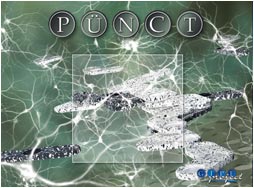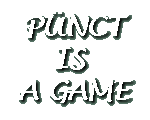|
PÜNCT is the last game of Project GIPF. From the beginning it was anounced that the project was going to become a series of 6 abstract games for 2 players. GIPF, the first and central game, was released in 1997. Now, 8 years later, the series is finally complete! As you may or may not have noticed, the graphics of the GIPF box shows a board with pieces in a wide, natural environment. The idea behind this design was putting an abstract game, symbolizing the human mind, in the midst of the 4 elements. The sceneries on the boxes of the 4 games that followed, TAMSK, ZÈRTZ, DVONN and YINSH, represented, respectively, earth, water, fire and air. That left one possibility for the last game, which is explained as follows in the rulebook: This is a game about the 5th element: spirit, in its broadest sense! That is: the human mind, the mix of conscious and sub-conscious, divine sparks of inspiration, the potential to create. And therefore, also,: the sense for meaning, the sense for art, the sense for beauty. And, last but not least, also: courage! Linking the elements, interpreting what exists, daring to add a personal touch! That is why PUNCT is a game about connecting opposite sides. In short:
Jan-Hendrik
Strenzke in LoRP
|

